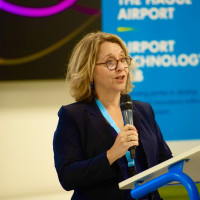We are between the last session between the awards and drinks. So thank you all for coming. If we talk about verifiable credentials in travel, it is very use case driven and there are some, some purposes that we have to meet. Two very important ones that is of course security in travel and meeting regulation and international treaty compliances. And the other one is creating a seamless travel experience and being contactless and having biometrics as a enabler for this.
In travel, what is very specific is that if we cross a border, we do need a government issued identity to that needs to be verified. So in a, in a verifiable credential, that also needs to be a government issued verifiable credential for domestic travel. That could be an identity card or a mobile driver's license. But in general, 99% of the cases you need a government issued identity.
Now we have a few of those in the us. They're piloting with a mobile driver's license. Very exciting. The digital travel credential, IKO has written specifications. First trials are going on.
I'll shortly talk about one in particular. And we have the EU digital wallet coming up and what E I D we will be using there. We'll be talking about that too in a bit. We are talking in travel about crossing borders, complying with rules and regulations in order to have security, but in also in order to board a flight. There's specific rules and regulations in the I K O N X nine, which are in all the member states. National law. You have to comply with rules of regulation before you board a flight. It's the airline that needs to comply. A hotel also needs to comply.
In most countries, a hotel needs to register based on the passport or an identity card identity data and needs to con share that with a authority.
So when we're crossing borders, we're crossing international jurisdictions. And then of course trust and data privacy, data protection are crucial elements. There is a lot happening in the world of digital identity. I already mentioned the mobile driver's license.
Of course, the EU digital wallet is coming up and there are several pilots right now going on with digital travel credential or in preparation. And I was very lucky to be involved in one in Aruba where we piloted the digital travel credential in a wallet. And the digital travel credential is a self derived credential using the phone and NFC and then it ends up in a wallet, becomes a verifiable credential. We developed a wallet, very open source wallet, not to be the wallet, but a wallet that will allow us to use the verifiable credential.
And our first step is to derive that credential and then use the data for the online implication.
DISEMBARKATION card. That is a obligation if you want to travel to the country of Aruba. Many countries have this used to be these cards that you would have to fill in in the, on the plane in the analog old world. And right now that is online. But if you do that by hand, web-based, of course, then you can have typos. Now for the government, it is crucial that you have clean information without any mistakes.
Now, by having an interface with the QR code, we were able through that wallet to derive and fill the fields in the embarkation cation card with the correct data. Thereby the, the government in advance has the verified passport data. Now we did that as a pilot last month and a an okay two board was shared with the passenger and the passenger was able to share that with the airline.
And in our next steps, we are looking forward to share that, okay, to board with the airline through an interactive api.
Not the api you probably know, but the advanced Passenger information system, another API and other steps are sharing it, but through selective disclosure with a hotel to make sure your check-in is done online very, and you will be in 30 minutes on the beach, which is the slogan that Aruba always strive for. And the beaches are great.
And yes, you should go, of course this is a big corporation between public and private parties. This cannot be done without the government. You cannot cross a border without having the government involved. You need the airlines, you need providers. And we started out with a biometric single token in a locally federated identity management system, which called, was called the Happy Flow in 2015. Moved on to a health credential during the pandemic. And now we have the happy flow and
Keep, we will keep you informed through all kinds of social media channels for next steps of what is going on.
And it is important to keep in updated of what the other development that's are go that are going on. Because right now this is in development and we are learning on the go and everybody is learning on the go.


















































